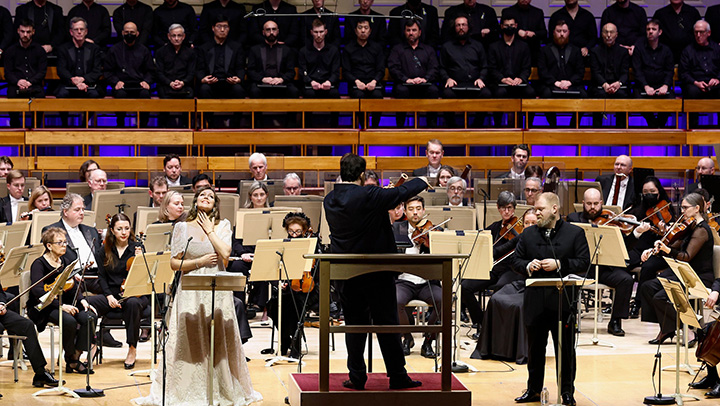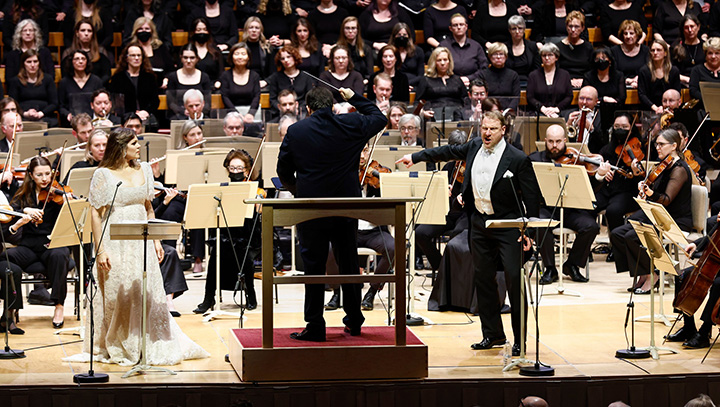Perhaps you have wondered where the tallest of Peter’s (former) Angels has been since pre-pandemic performances found her in worryingly unsteady vocal estate. Confined, like her character in Dmitri Shostakovich’s Lady Macbeth of Mtsensk on Saturday, increasingly to the provinces and giving only two staged performances of 2023 (a pair of Aidas in Vilnius), Opolais has whittled down her repertoire to a small handful of roles and has not appeared in New York since Suor Angelica in 2018 (for which she tied with Diana Damrau in La traviata for parterre box‘s coveted “pubie” award for “Worst performance in a diva role”).
The bad news first: while not substantially further decayed, the voice is in about the same shape as you probably remember it – the raw, arid base sound still goes down like Fireball whiskey. Beyond that, it’s resistant to any attempts at coloring. The wobble resounds, the attacks are iffy, and vinegar high notes offset a chest register that was so devoid of oomph by the end that it’s frankly surprising that Tosca remains one of the few parts she seems to consistently sing.
Yet her Katerina Izmailova, which she sang for the first time in these concert performances with the Boston Symphony Orchestra (they were recorded for Deutsche Grammophon), was a qualified success. The poignancy of her anguished gravitas and measured plastique is less of a surprise (she was always, to put it diplomatically, a “singing actor”), but under the direction of her ex-husband Andris Nelsons and dressed like a vampy Glinda, the part flatters her current capabilities to a very compelling and even very moving end.
To say that the merry murderess of Mtsensk is in Opolais afforded a sort of timbral roughness befitting her depraved character, a bored housewife who murders her belligerent father-in-law (Boris) and effete husband (Zinovy) after an ill-advised romance with a piggish laborer (Sergei), is certainly true, but that’s only part of the equation. The effects she uses, whether by choice or necessity, work for the character; as Katerina bemoans her situation or indulges in the amorous excitement of her affair, her expansive breath control, for one, lets her lift long, surprisingly coherent lines from the cacophonous score.
Her attempts at straight-tone singing, stymied by the wobble, often yield a surprisingly intimate and immediate quasi-sprechstimme. Her instability with pitch makes the microtonal yelps that characterize both physical violence and sexual pleasure especially vivid, and her whispered asides are quite chilling (though they may be lost in the more cavernous Carnegie Hall tomorrow). Opolais’s sound, both squally and glinty, is one that never seems fully able to blend with other singers or instruments. It can only contrast, and in a score whose hallmark is its endless inventiveness with contrasting instrumental timbres, she seemed a natural addition.
Nelsons, I imagine, deserves credit for helping to sculpt her interpretation in so satisfactory a way. In many ways, the performance resembled the BSO’s 2015 landmark Elektra which also marked a return for its prima donna, Christine Goerke. Nelsons relishes in the piece’s mercurial changes in interior drama and he’s not afraid to frequently pull a terrifying wall of sound from the amassed forces of the Orchestra and the Tanglewood Festival Chorus. But the conducting, which largely maintained a clean, martial quality throughout the 3.5 hour evening, made the piece sound more menacing and mean than I’ve ever heard. In an opera that makes light business of sexual assault and sexual harassment, Nelsons seemed hell-bent on purging the opera of its musical sarcasm; the trombones, integral for their humorous glissando flaccidity during the interludes depicting sex between Katerina and Sergei, here sounded sinister. In the opening chords of Act III preceding the discovery of Katerina’s husband’s body, the brass brought heat without warmth and the interlude preceding the attempted rape of a laborer in Act I was relentlessly raucous.
The concert format aside, Nelsons’s take built better case for the work as a score than as a coherent opera; its vocal dramaturgy feels especially juvenile and underdeveloped (Shostakovich was around 25 when he wrote it). Nelsons sees that the score contents itself with building up storms of orchestral movement rather than offering much psychological insight into its vaguely sketched yet non-archetypal characters. This doesn’t mean that it’s an interpretation is devoid of sensitivity—there was often real delicacy and balance in the strings as Katerina tries to sleep, haunted by the murder of her father-in-law, in Act II—but the work’s emotional toll left me exasperated and unsettled. All’s to say, Nelsons’s take is valid, but it’s also even bleaker than the opera already is.
As Katerina’s asshole accomplice Sergei, Brenden Gunnell was a subtle physical comedian. What his muscular, woody sound lacked in brilliance it made up for in consistency across his register. Such consistency seemed to evade Günther Groissbock who, predictably, chose to bark most of Boris’s music despite having the breath control to build it into something more seamless. He was accordingly more frightening in his moments of quiet manipulation, like when he whips Sergei after discovering the affair, or his death scene by way of poisoned mushrooms, than in moments of full-out rage. In this regard he was flattered by bass Goran Juric as the bumbling village priest who made Groissbock’s bluster look reserved.
Peter Hoare was in refreshingly beautiful voice as Katerina’s husband Zinovy and the rich-toned Maria Barakova as Sonyetka, the equally doomed convict for whom Sergei ditches Katerina, excelled in her brief assignment of standing around and looking pretty. In an opera that offers many “there are no small parts, only small actors” moments, Patrick Guetti boomed as the Officer and Sentry ordering the final march to Siberia, Dmitry Belosselskiy brought a dogged vibrato and sense of dignity to the part of the Old Convict, Anatoli Sivko was especially charismatic as the Chief of Police, and Alexander Kravets put up a scene-stealing fight with the orchestra as the Shabby Peasant.
New York, which saw revivals of Lady Macbeth of Mtsensk in 2014 and 2022, has hardly been starved for this grisly work. Yet Nelsons’s take promises something darker, vaster, and more disquieting than Graham Vick’s wry and incisive Met staging provides. And with the intelligently (ex-)husbanded remains of an undead kunstdiva at the center, it promises to be a memorable evening.
Photos: Winslow Townson





